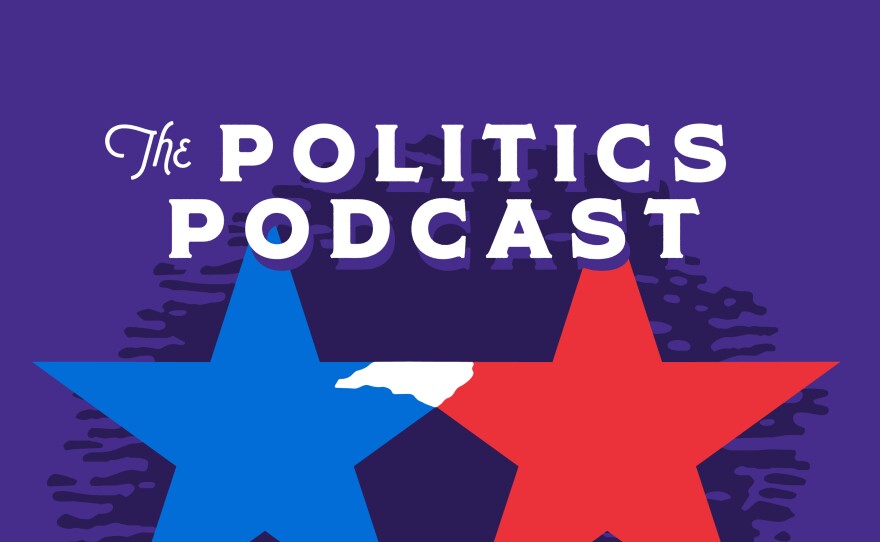Updated at 4:15 p.m.
Voters’ ballots for school board elections will look different next year in a handful of districts in western North Carolina.
The Senate approved two bills Tuesday that would change election rules for a handful of school boards in the western half of the state. The House passed one of those bills, House Bill 66, on Wednesday afternoon and it will become law. As a local bill, it does not require the governor’s signature.
In that bill, four school board elections — Catawba County, Hickory City, Newton-Conover City and Polk County — would change from nonpartisan to partisan, meaning that a candidate’s party affiliation would appear on the ballot. That can boost candidates who hail from the county’s majority party. The two bills are part of a continued trend by Republican state lawmakers to make school board races partisan where it benefits their party.
In Buncombe County, the school board election will remain nonpartisan, but electoral lines will be redrawn. The Buncombe County school board passed a resolution last week opposing the bill.
The school board’s vice chair Amy Churchill, the lone registered Republican on the board, said she supported the resolution.
“There's a small group of individuals who were unhappy about the results of the last school board election, and they are the ones that have been pushing this bill,” Churchill said. “We haven't had public comment on this, or parents coming to us saying they don't feel that they're represented — quite the opposite.”
Sen. Warren Daniel, R-Buncombe, supported the measure, which was added last week as a committee substitute to a bill affecting school board elections in other counties. He was the only state lawmaker representing Buncombe County who supported the bill.
The change means that six of the seven Buncombe County school board seats will be voted on only by voters who live in that seat’s jurisdiction.
“At-large voting, which is the current practice in Buncombe County, fails to ensure that all neighborhoods in the county are represented,” Daniel said while debating the bill. “It favors representation for the more dense areas of the county. It is also inherently more expensive and time-consuming for a candidate to market themselves across an entire county.”
Democratic Sen. Julie Mayfield opposed the bill saying, “This feels very much like the General Assembly doing something 'to' Buncombe County as opposed to 'for.'”
Buncombe County school board election proposed changes
Currently, the Buncombe County school board is composed of six members who reside in attendance zones for each of the school district’s traditional high schools and one at-large board member representing the entire county. Voters are able to cast ballots for all of the seats up for election, which are elected to four-year terms.
But Sara Disher Ratliff, who ran for school board last year as a Republican, said when she was campaigning she realized many Buncombe County voters didn’t know they could vote for every school board seat. She said that confusion likely discouraged voters from casting ballots for some seats.
“Often I was met with, ‘I would love to vote for you, but I don't live in your district,'’’ Ratliff said. “The GOP during the ‘22 campaign made a valiant push to educate voters on the fact that the entire county could in fact vote for all the district seats.”
House Bill 66 redraws the electoral lines so that every voter can vote for one Buncombe County school board candidate to represent their electoral district as well as a single at-large member. New electoral lines must be drawn.
Buncombe County GOP Chair Doug Brown said the current system tips the favor to the county’s majority Democratic party.
“There are concerns with the ideological balance of the school board,” Brown said. The current board has one registered Republican and two registered Independents, but Brown added, “They all vote together.”
“Our board members feel very strongly that when we're making decisions, we're making them in the best interest of every student,” said Churchill. “Having to change the makeup of the districts for the board is going to result in at least one, possibly two or three [school] attendance zones not having a representative.”
The school board has also raised concerns about the cost and difficulty of redrawing those electoral maps due to the complex lines separating Asheville City Schools and Buncombe County Schools. For example, some U.S. Census tracts encompass neighborhoods in each school district, and some city school district neighborhoods are situated like islands surrounded by county district lines.
Buncombe County Schools’ attorney Dean Shatley said the district contacted the consulting firm Frontwater Geo Planning and Design to get a cost estimate on writing new electoral maps.
“They generally charge about $17,000 to $20,000 [to redraw election maps], but after talking with them, there was some complication,” Shatley said. “Because it is complicated, they were unable to give me a quote yet.”
Daniel’s office said if the cost of redistricting is prohibitive, the school board can request for nonpartisan state personnel at the General Assembly to redraw the lines at no cost to the school district. According to the bill, if the school board does not redraw the electoral lines by February 2024, then members of the General Assembly would redraw the lines.



